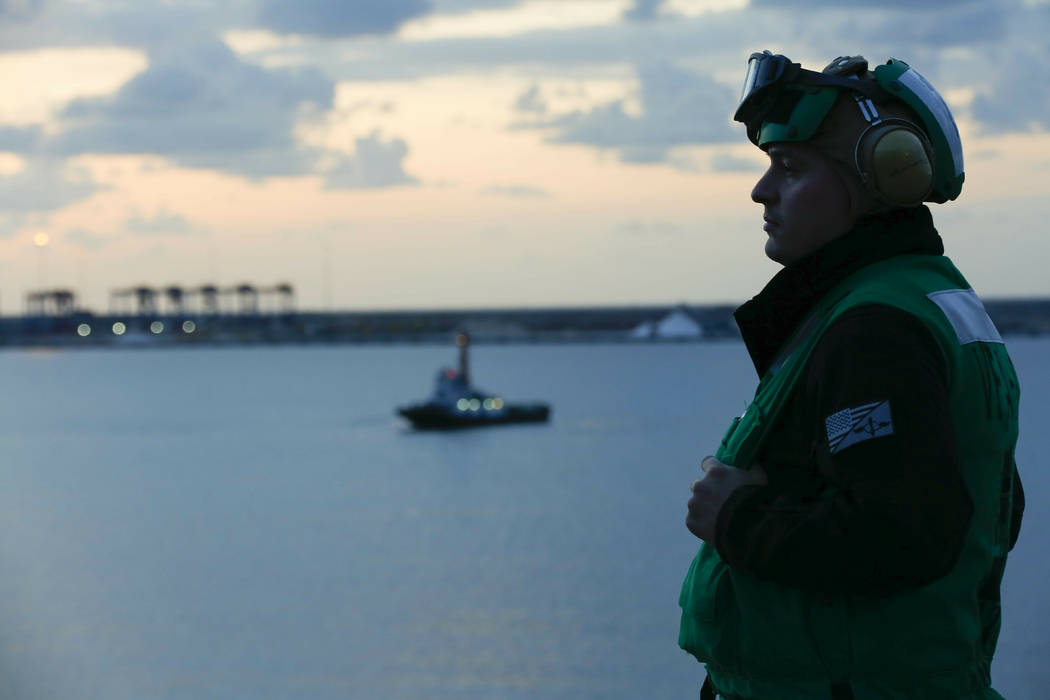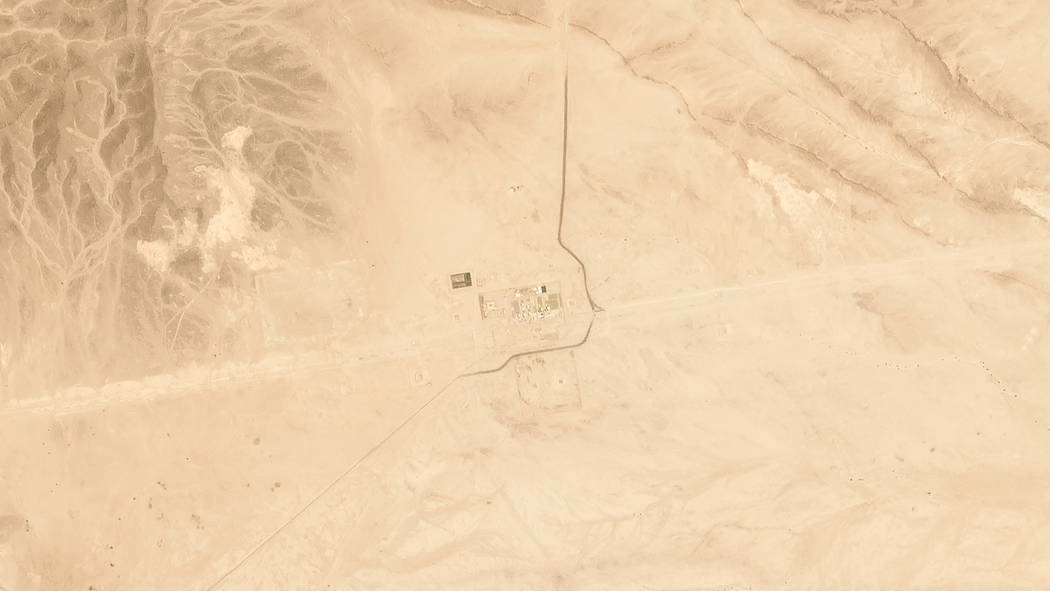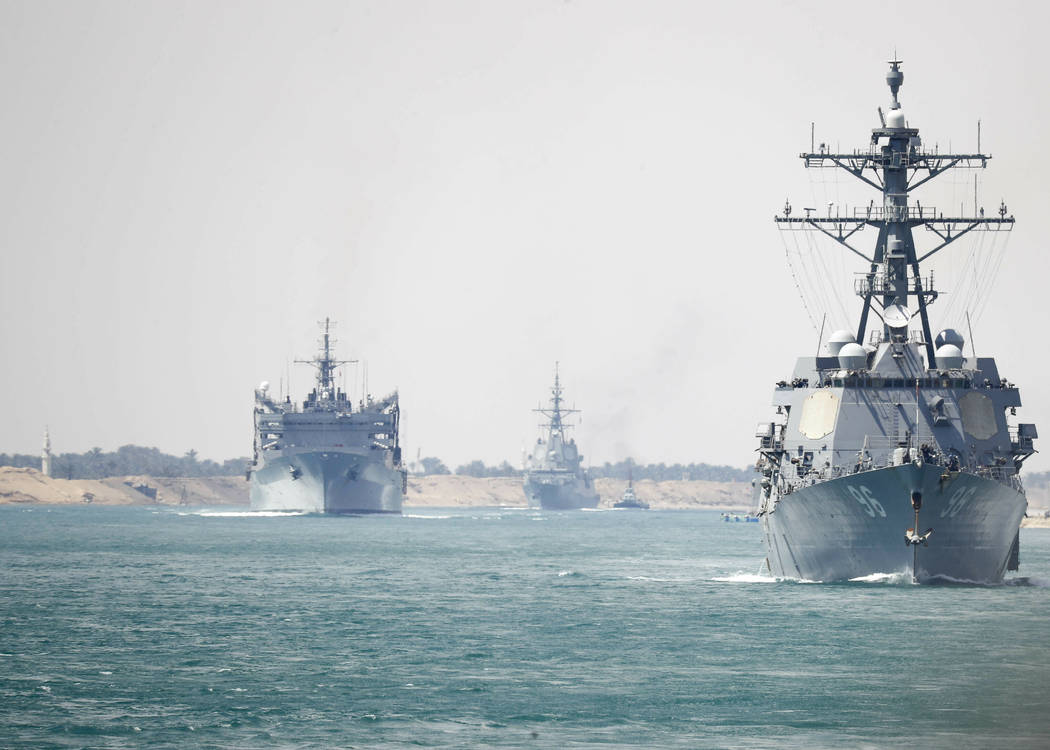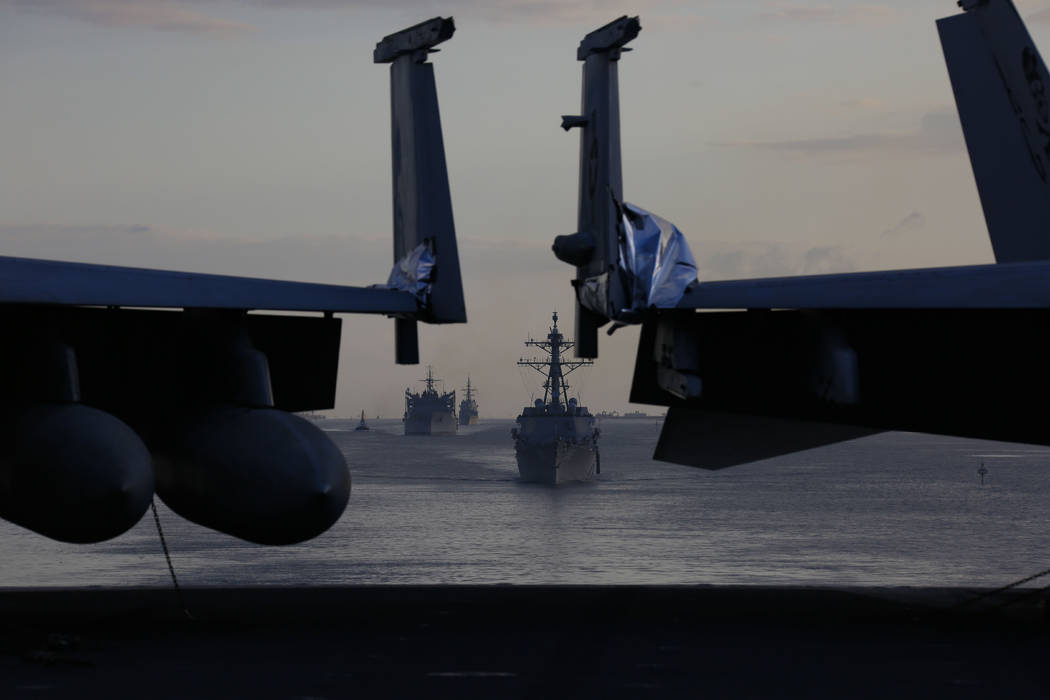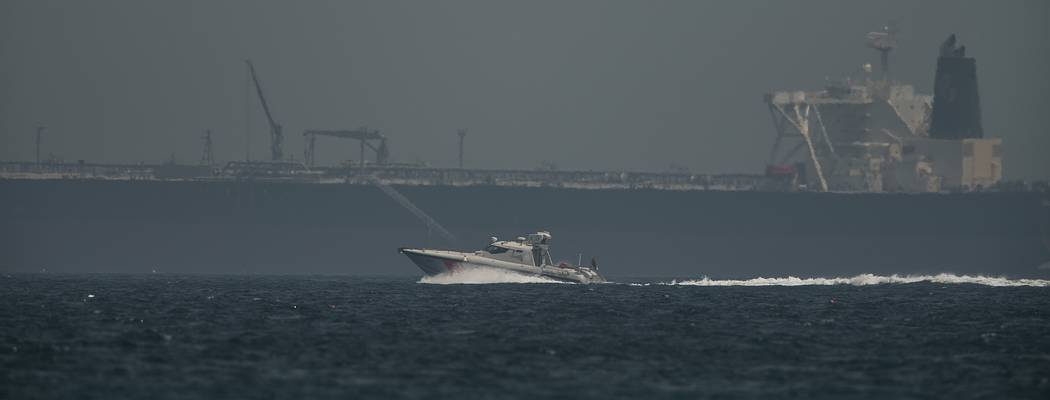US pulls nonessentials from Iraq amid Mideast tensions
BAGHDAD — The U.S. on Wednesday ordered all nonessential government staff to leave Iraq, and Germany and the Netherlands both suspended their military assistance programs in the country in the latest sign of tensions sweeping the Persian Gulf region over still-unspecified threats that the Trump administration says are linked to Iran.
Recent days have seen allegations of sabotage targeting oil tankers off the coast of the United Arab Emirates, a drone attack by Yemen’s Iranian-allied Houthi rebels, and the dispatch of U.S. warships and bombers to the region.
At the root of this appears to be President Donald Trump’s decision a year ago to pull the U.S. from Iran’s nuclear deal with world powers, embarking on a maximalist sanctions campaign against Tehran. In response, Iran’s supreme leader issued a veiled threat Tuesday, saying it wouldn’t be difficult for the Islamic Republic to enrich uranium to weapons-grade levels.
Leaders to be briefed
Top leaders in Congress will be receiving a classified briefing on the Middle East as lawmakers demand answers from the White House about Trump’s actions toward Iran.
Multiple sources said Wednesday that the top House and Senate leaders of both parties would be briefed by the administration. The sources were not authorized to discuss the matter and were granted anonymity.
Thursday’s planned briefing comes amid rising tensions in the Persian Gulf region over still unspecified threats the Trump administration says are linked to Iran.
Signs unclear
The movement of diplomatic personnel is often done in times of conflict, but what is driving the decisions from the White House remains unclear. A high-ranking British general said there was no new threat from Iran or its regional proxies, something immediately rebutted by the U.S. military’s Central Command, which said its troops were on high alert, without elaborating.
Last week, U.S. officials said they had detected signs of Iranian preparations for potential attacks on U.S. forces and interests in the Middle East, but Washington has not spelled out that threat, and an alert on the website of the U.S. Embassy in Baghdad said that all nonessential, nonemergency U.S. government staff were ordered to leave Iraq right away under State Department orders.
The U.S. in recent days has ordered the USS Abraham Lincoln aircraft carrier strike group to the Gulf region, plus four B-52 bombers.
Germany stops training
Germany’s military said it was suspending training of Iraqi soldiers due to the tensions, although there was no specific threat to its own troops in Iraq. Defense Ministry spokesman Jens Flosdorff said Germany was “orienting itself toward our partner countries” though there are “no concrete warnings of attacks against German targets.”
German Chancellor Angela Merkel’s spokeswoman Ulrike Demmer expressed concern over the tensions and said it welcomes “any measure that is aimed at a peaceful solution.” Foreign Ministry spokeswoman Maria Adebahr said the German government has not reduced its embassy staff in Iraq or Iran.
In the Netherlands, state broadcaster NOS said its 50-person military mission in Iraq was halted “until further orders,” quoting a Defense Ministry spokesman as saying he couldn’t elaborate on the threats. It said the Dutch forces primarily train Kurdish forces fighting the Islamic State militants.
Iran nuclear comment
The remarks about Iran’s nuclear program by Supreme Leader Ayatollah Ali Khamenei came Tuesday night in Tehran at an iftar, the traditional dinner Muslims have when breaking their daily fast during Ramadan. His comments first focused on playing down the risk of a wider conflict with America.
He told senior officials that his country won’t negotiate with the U.S., calling such talks “poison,” but he also said, “Neither we, nor them is seeking war. They know that it is not to their benefit,” according to the state-run IRAN newspaper.
Tehran is threatening to resume higher enrichment on July 7 if no new nuclear deal is in place, beyond the 3.67% permitted by the current deal between Tehran and world powers.
Iranian officials have said that they could reach 20% enrichment within four days. Though Iran maintains its nuclear program is for peaceful purposes, scientists say the time needed to reach the 90% threshold for weapons-grade uranium is halved once uranium is enriched to around 20%.
“Achieving 20% enrichment is the most difficult part,” Khamenei said, according to the newspaper. “The next steps are easier than this step.”
It was a telling remark from the supreme leader — Iran is not known to have enriched beyond 20% previously and it’s unclear how far Tehran is willing to go in this process. Khamenei has final say on all matters of state in Iran.
7 drone launches
On Tuesday, Yemen’s Iran-aligned Houthi rebels launched a coordinated drone attack on a critical oil pipeline in Saudi Arabia, Tehran’s biggest rival in the region. It was the latest incident to shake global energy markets, as authorities allege oil tankers anchored off the coast of the United Arab Emirates were targeted by sabotage. Benchmark Brent crude prices remained around $71 a barrel in early trading Wednesday.
Yemen’s Houthi rebels, who are at war with Saudi Arabia and are believed by the West to receive weapons from Iran, said they launched seven drones targeting vital Saudi installations. That included two pumping stations along its critical East-West Pipeline, which can carry nearly 5 million barrels of crude a day to the Red Sea.
Saudi Aramco, the government-controlled oil company, said it temporarily shut down the pipeline and contained a fire, which caused minor damage to one pumping station. It added that Saudi Aramco’s oil and gas supplies were unaffected.
An image from San Francisco-based Planet Labs Inc. that The Associated Press examined Wednesday shows Saudi Aramco’s Pumping Station No. 8 outside of the town of al-Duadmi, 330 kilometers (205 miles) west of the kingdom’s capital, Riyadh.
The photo, taken after the attack, shows two black marks near where the East-West Pipeline passes by the facility — marks that weren’t in images from Monday. The facility otherwise appeared intact, corroborating in part Saudi Arabia’s earlier comments. The website TankerTrackers.com, whose analysts monitor oil sales on the seas, first reported about the black marks.
Sabotage details unclear
Details remain unclear around alleged acts of sabotage to four oil tankers, including two belonging to Saudi Arabia, off the coast of the UAE’s port of Fujairah. Satellite images seen by the AP from Colorado-based Maxar Technologies showed no visible damage to the vessels, and Gulf officials have refused to say who might be responsible.
The MT Andrea Victory, one of the alleged targets, sustained a hole in its hull just above its waterline from “an unknown object,” its owner Thome Ship Management said in a statement. Images of the Norwegian ship, which the company said was “not in any danger of sinking,” showed damage similar to what the firm described.
A U.S. official, speaking on condition of anonymity to discuss an ongoing investigation, has said the other three showed damage as well.
The unspecified threats reported by U.S. last week from Iran and its proxy forces in the region targeting Americans and American interests contradicted remarks by British Maj. Gen. Chris Ghika, a senior officer in the U.S.-backed coalition fighting the Islamic State group. He said Tuesday that “there’s been no increased threat from Iranian-backed forces in Iraq and Syria.”
Later, in a rare public rebuttal of an allied military officer, U.S. Central Command said Ghika’s remarks “run counter to the identified credible threats” from Iranian-backed forces. In a statement, Central Command said the coalition in Baghdad has increased the alert level for all service members in Iraq and Syria.
———
Gambrell reported from Dubai, United Arab Emirates. Associated Press writers Nasser Karimi in Tehran, Iran, Aya Batrawy in Dubai, United Arab Emirates, Angela Charlton in Paris, Geir Moulson in Berlin and Robert Burns and Lolita C. Baldor in Washington contributed.



